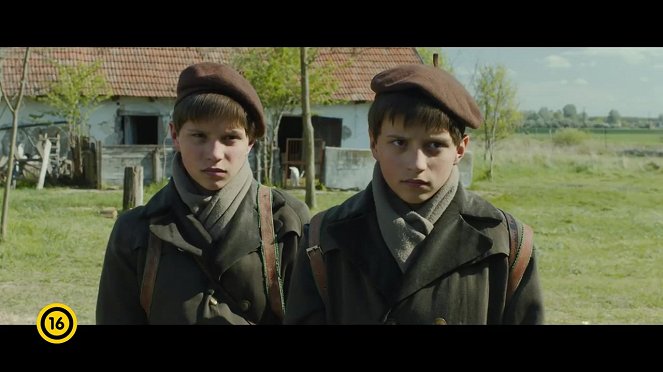Reżyseria:
János SzászZdjęcia:
Christian BergerObsada:
András Gyémánt, László Gyémánt, Piroska Molnár, Ulrich Matthes, Ulrich Thomsen, Lajos Kovács, Orsolya Tóth, János Derzsi, Miklós Székely B. (więcej)VOD (1)
Opisy(1)
II wojna światowa. Ojciec przed rozstaniem z dwoma trzynastoletnimi synami daje im zeszyt przykazując, aby zapisywali w nim codzienne doświadczenia. Chłopcy mają znaleźć schronienie na wsi, u babci. Jednak kobietę bardziej interesuje zawartość butelki niż jej własne wnuki. Zamiast azylu chłopców czeka brak miłości, walka o przetrwanie i doświadczenie w pełni okrucieństw wojny. Koszmarna rzeczywistość znajduje odzwierciedlenie w rzeczowych, pozbawionych uczuć wpisach w zeszycie. Film pokazuje drastyczny obraz wojny widzianej oczami dziecka, choć nieco inny niż kino zdążyło nas przyzwyczaić. Obserwujemy proces utraty złudzeń i wymuszone, przyspieszone przejście głównych bohaterów w dorosłość. (Aurora)
(więcej)Recenzje (1)
Yes, Szász really did not live up to his reputation as an uncompromising and original filmmaker that he had in the 1990s. The Notebook looks more like an Eastern European HBO production - a relatively intimate expedition, repeating the same locations, and the fact that it is directed relatively sedentarily. If I deviate from these secondary categories, I also have complaints about the script, which is too dependent on the book by Ágota Kristóf. On the one hand, he draws harsh and raw monologues from it, on the other hand, he sometimes quite roughly motivates what seemed to look natural in the book. Nevertheless, Szász conquered me with these lessons in hardness, renunciation and suffering. The central duo of "wolves" is excellent, the grandmother is sweet and some of the supporting characters are irresistible. In particular, the middle of the film, in which the ruin of maternal love intertwines with the flow of swearing and drastic scenes, only captured artistically in a notebook, is amazing. War penetrates the boys' world as a reflection, and they fight their own war in order to defeat emotions and uproot all love. The stream of blows and deviant episodes, culminating in a drastic act, exudes a musty, unpleasant atmosphere that remotely resembles Haneke's The White Ribbon. It’s too bad about the unfinished stylization, but it’s still a significant experience.
()

